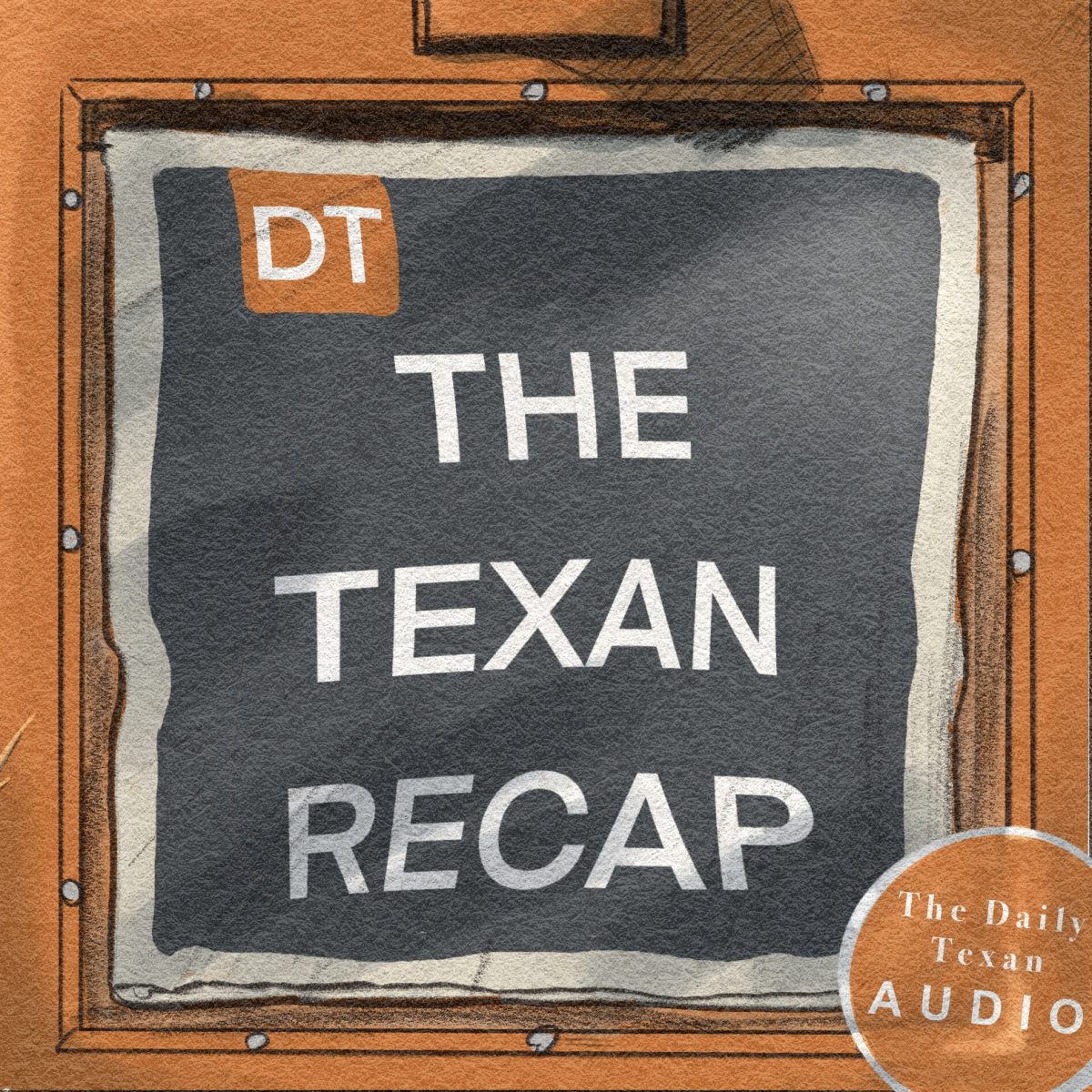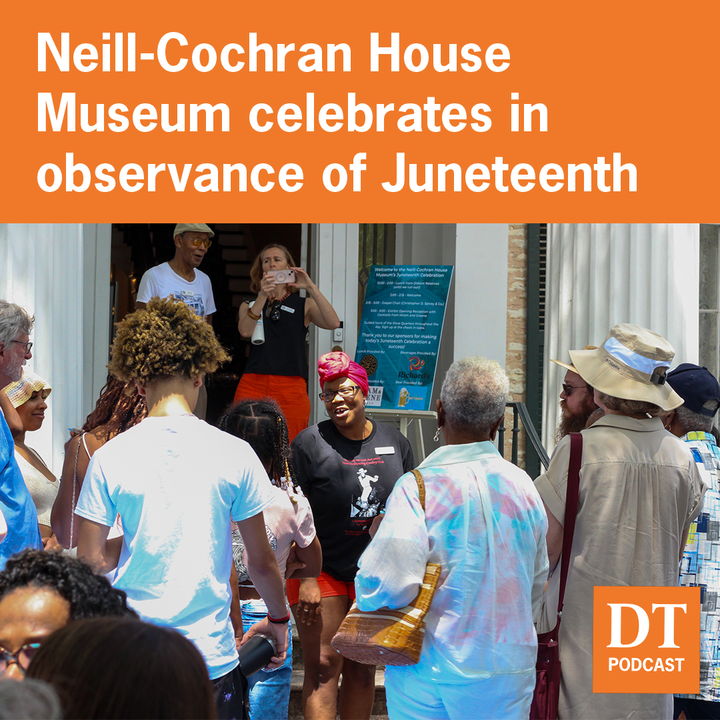Editor’s note: This podcast was originally published on Spotify on Oct. 15, 2023.
In this week of The Texan Recap, audio producer Sriya Dommaraju talks about Senate Bill 12, a law that restricted sexually oriented performances on public properties, and why it was found unconstitutional. Also, learn about RecoveryPeople and why a UT professor was granted a Lifetime Achievement Award.
Reported by Sarah Brager and Flora Farr. Hosted by Sriya Dommaraju. Edited by Jack Lewellyn. Supervised by Melody Jones and Aislyn Gaddis. Cover art by Emma Berke. Music by Top Flow Productions.
*upbeat music*
Sriya Dommararju: The Texas Senate bill banning drag performances was found unconstitutional by a federal judge…and, UT Professor Lori Holleran Steiker is honored with a Lifetime Achievement Award
I’m your host this week, Sriya Dommaraju and this is The Texan Recap.
Here’s what you missed this week.
*upbeat music*
Sriya: Texas Senate Bill 12, which bans public drag performances, was found unconstitutional by a federal judge late last month. Senior News Reporter Sarah Brager is here with the story. Thanks for being here today, Sarah.
So Senate Bill 12 was found unconstitutional by a federal judge last month, but to give listeners some context, what did that bill do?
Sarah Brager: So Senate Bill 12 essentially restricted quote, sexually-oriented performances on public property on the premises of a commercial enterprise and in the presence of a child, and the bill defines sexually oriented performances to include male performers exhibiting as female or female performers exhibiting as male. So the language basically bans drag performers from doing shows in public areas. And to clarify this language doesn’t include establishments like bars where someone would have to show an ID to enter. But the bill did say those who do perform in the restricted areas listed would be committing a criminal offense.
Sriya: And why was it found unconstitutional?
Sarah: So the court found this unconstitutional because it violates the First Amendment rights of the performers and more specifically their freedom of speech. Judge Hytner said in the ruling that the language of the bill was overbroad and vague, meaning that if enforced it would also impact other performers like for example Shakespearean actors who aren’t even considered, quote inappropriate. Additionally, the bill restricts drag performers on the basis of their content and means for expressing themselves, which is not constitutional because it violates the First Amendment.
Sriya: Who filed the lawsuit and why?
Sarah: So the American Civil Liberties Union or ACLU of Texas, and Baker Botts LLP filed the lawsuit in August on behalf of five plaintiffs, and those plaintiffs included The Woodlands Pride, Abilene Pride Alliance, Extragrams, LLC, 360 Queen Rntertainment LLC, and Austin-based drag performer Brigitte Bandit who I was able to speak to for this story. And in their testimonies, the plaintiff said the legislation threatens their livelihood, because drag is partially how they make money and threaten their freedom of expression, which is why they decided to challenge it in court.
Sriya: You talked to two local drag performers for this story, Brigitte Bandit and Iggy Bank. What did they tell you?
Sarah: So when I asked them about their reactions when they first heard the court had found this bill to be unconstitutional, both performers told me they were shocked and elated about the news. Bandit even told me she spent a lot of the day crying because it was such a relief. They said a lot of drag performers have been involved in this fight for months, some even more than a year. And they said achieving this win is really important for the drag community and the broader LGBTQ+ community. Bandit told me she wasn’t really taken seriously when she tried to testify before the Senate earlier this year. And she said this lawsuit was actually the first time she felt truly heard by some people in power. And bank told me she wants to break down the misconceptions about drag because it’s really about educating the younger LGBTQ+ community and demonstrating solidarity for those young people.
Sriya: So initially, there was a temporary restraining order to prevent the bill from going into effect on September 1, and now there’s this new permanent injunction, but what happens now?
Sarah: So the permanent injunction means that Texas government officials cannot enforce any part of SB 12. The Texas Attorney General Ken Paxton is expected to appeal the decision meaning the case could be reviewed in higher courts. But we don’t exactly know what the rest of this lawsuit is going to look like. We do expect the legal battle to continue and Bandit and Bank along with other members of the drag community said they’re prepared to keep advocating.
Sriya: That was senior news reporter Sarah Brager. Thanks for joining me.
Sarah: Of course. Thanks for having me.
*upbeat music*
Sriya: UT Professor Lori Holleran Steiker was given this year’s RecoveryPeople Lifetime Achievement Award for her work in substance abuse recovery. General Life & Arts Reporter Flora Farr is here to tell us about it. Thanks for joining me, Flora. So what is RecoveryPeople and what is their Lifetime Achievement Award?
Flora Farr: So RecoveryPeople is a 501(c)3 charitable nonprofit, and this nonprofit is really unique because it’s run by leaders who are in long-term recovery from substance use. Every September their staff members nominate individuals for four different awards and one of them is the Lifetime Achievement Award that I discussed in this article. So this award kind of celebrates a person who’s in long-term recovery, for being a change maker through their recovery and making use of that lived experience that they have.
Sriya: Who is Professor Lori Holleran Steiker and why did she receive this award?
Flora: Professor Lori Holleran Steiker is a professor here at UT, who has been working here since 2000. So she’s been here for a minute. She currently holds the position of being a professor for addiction recovery and Substance Abuse Services here at the Steve Hicks School. And she’s also an Associate Director for Education and Training in Undergraduate College. Since 1989, Holleran Steiker has been working to help people who are in recovery. After going through her own experience in recovery, she felt this strong pool to helping people in that field, she really wanted to let them know that they were heard with her own perspective on it having been so in recovery. So since then, she has been working for around 34 years to help these people and educate others about the field of substances. And she’s done that through her teaching. And also through outside organizations. She started a lot of different drug and substance use like support systems here on campus, but also around the city of Austin. She was at the forefront of the opioid response here in Texas. So she started or helped start the Texas Targeted Opioid Response Group, which brought a $3 million grant here to Texas to like help with that cause before it was even considered the opioid epidemic. And she also has worked to help found the first recovery High School here in Central Texas. So that was pretty awesome. How that high school works is they have a system that works along with the regular high school curriculum for these students. So that while they’re in school and receiving that education that is sometimes disrupted by you being in recovery, they can also be getting that really consistent, strong support of being in recovery.
Sriya: And what did she tell you her favorite projects have been?
Flora: So her favorite projects have been the Operation Naloxone and helping found the recovery High School. But she has also said that her biggest contribution by far is being a matchmaker and connecting the people that she does. And that’s something that when I discussed Dr. Holleran Steiker with one of her students, that came up a lot to how she’s just like a cheerleader and a matchmaker, and she really works hard to understand the people that she’s speaking with and understand the best way she can help them. And she’s good about knowing how far her help can go with them. So she’s always thinking of different ways to connect other people so that they can receive the best style possible.
Sriya: How has her own experience around substance abuse helped her with her work?
Flora: How she put it is that it’s kind of what drives her. What drives her work. It’s the reason that she got into the field. And since she’s been around substance abuse for as long as she has, I mean, she had her own experience with her family members when she was a kid. And so she always had this open mindset to recovery. She never had, like the negative stigma that others might go into it with thinking that oh, like being an addict means the end, basically. So she never had that conception. And it’s really powerful in her work. Because her same energy and conception that life can go on is almost infectious to the people that she works with and inspires the leaders that she’s working with, and it inspires people who are in recovery because they feel like they’re being seen and they feel like they can move forward and find success like she has.
Sriya: Why is her experience an important one to share?
Flora: Hers is really important to share because she’s living proof that people can still be successful through recovery. And she’s really made the most of her lifetime and that’s why she’s receiving the award. She’s made the most to help as many people as possible. She doesn’t have to do all the things that she does, but she goes out of her way all the time to find new ways to help people in the field. She could have stopped there at founding a high school and being a professor but she keeps going She helped start all these organizations like Shift which is on campus, or even starting the Operation Naloxone. She just is constantly searching for new ways to help people and the students that she’s teaching while doing this are inspired by her story. And I think that people across campus who hear her story of success can also be inspired if they’re facing issues like that or if they know others who are facing issues in recovery.
Sriya: That was General Life & Arts Reporter Flora Farr. Thanks so much for being here today. And that’s The Texan Recap for the week of October 9. I’m Sriya Dommaraju.
*upbeat music*
Sriya: The Texan Recap is a production of The Daily Texan Audio Department. If you like this episode, make sure you subscribe to The Daily Texan on your streaming platform of choice and follow us on Twitter @texanaudio. This episode was hosted by me, Sriya Dommaraju, edited by Jack Lewellyn and supervised by Aislyn Gaddis and Melody Jones. Special thanks to Sarah Brager and Flora Farr for their reporting and to Katy Nelson, Mimi Calzada and Chloe Moore for contributing to this project. Cover art is by Emma Berke and music is by Top Flow Productions. To read the news stories in this episode or see more from the Texan, head on over to www.thedailytexan.com. Thanks for listening, and I’ll see you next week!









